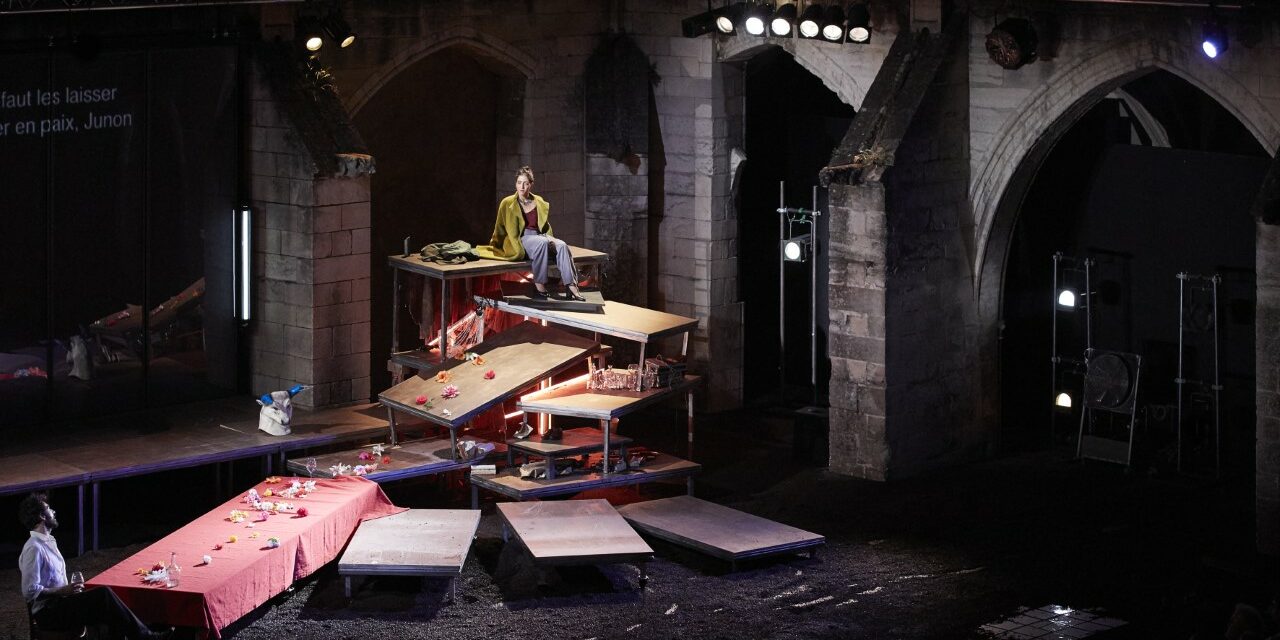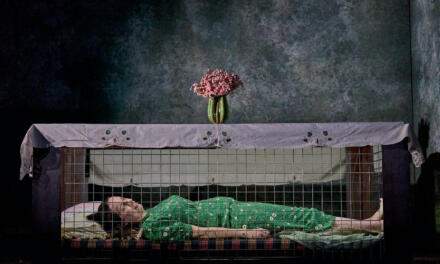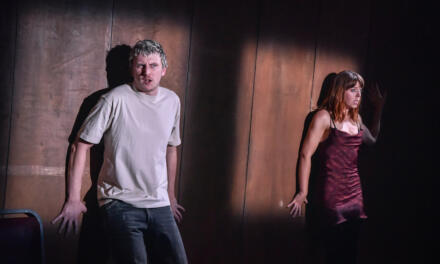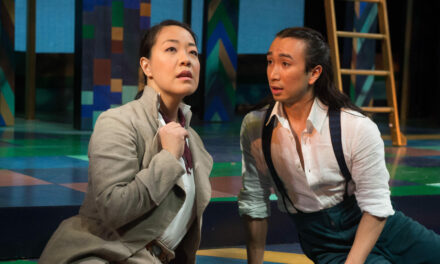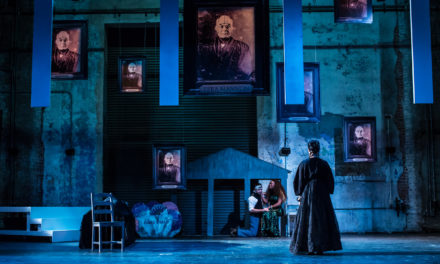An imaginative, dynamic, and visually striking production Sus d’autres cieux continues the Avignon 2019 theme of exile and making history. Kevin Keiss’s adaption of Virgil’s The Aeneid directed by Maëlle Poésy, the performance from Dijon takes us back to the mythological time of Trojan wars and the rise of Roman empire. Constructed from the fragments of Virgil’s poem that Keiss translated from Latin, the few episodes the company wrote themselves, and the scenes they developed during the rehearsals, Sus d’autres cieux focuses on the journey of Aeneas. A hero of the Trojan war, the son of the prince Anchises and the goddess Aphrodite (or Venus in this version), Aeneas is one of the more controversial figures of the Western literary canon. A soldier of his own command, in Virgil’s tale he is a toy in the hands of Gods thrown into what Paul Ricouer calls a collective singular of history against his will.
As director explains, it was this state of in-betweenness, “the sensation of living in a halfway state: between present and reality, between memory and the past, a sort of ‘no man’s land of the stateless,’” that caught her attention in the Virgil’s poem. To express it theatrically, Poésy decided to mix the narrative past and future, with the chorus scenes intersecting the encounters of the individual characters. Using video projections, dance sequences, dialogue spoken in several tongues, stage haze and even some sensations triggering our olfactory responses, Poésy creates the stillness of exilic voyage. The movement of the chorus serves as its framing device.
At the same time, Sus d’autres cieux can be also read as a memory play, narrated by Aeneas who despite his inability to lead the action survives his exile and lives to see the comings of the empire. Poésy’s staging supports this reading of Aeneas’ character and Virgil’s tale as well. The production unfolds in two clearly marked stage areas: the space of people and the space of Gods. The Gods, as cruel and menacing as they can be, repeatedly exercise their will and power. Standing behind the glass wall, visible to the audience but not to Aeneas or his people, they make the history as they desire, watching mortals struggling to understand and live through the atrocities imposed on them.
Aeneas has no power or will of his own. Thrown into the sea of wars and exile, he and his people are forced to move from one city to the next and seek asylum. On the journey, they lose faith, close friends and relatives. Sometimes they encounter hospitality and even love. But nothing is sacred for the Gods, and so Dido’s love for Aeneas and their marriage get thrown under the wheels of history as well. The Gods have their divine plans – Aeneas’ son, Ascanius, is to become the founder of Rome, the ancestor to Romulus and Remus.
The significance of Virgil’s poem is difficult to overestimate. Constructed under the influence of Homer, this text became a defining narrative of the Roman Empire, in which the vision of a prosperous economic, cultural, political and military regime was put forward. In the monologue of Anchises, who Aeneas visits in the land of the dead at the lowest of his despair and helplessness, Virgil draws the picture of the Rome to come. Looking beyond the horizons visible to the living, Anchises draws the future based on the primacy of the organized rule, the state’s authority over its people, as the only social order which could provide the nourishing environment for its citizens and their happiness.
Maëlle Poésy chooses to end her production with this monologue. At the stage left, standing on the pile of platforms, Anchises tells Aeneas his future, sketching his family’s imminent prosperity. The play ends as it began – with the movement of the chorus, marching forward to their promised land. To a certain extent, one might say, Poésy privileges an open ending. But making the play end as it began, it remains unclear what future the director and her company envision for today’s refugees and asylum seekers, and what empire they think these new exiles would build, when the artists claim the need of bringing Virgil’s tale closer to our times.
SOUS D’AUTRES CIEUX after Virgil’s The Aeneid
Adaptation Maëlle Poésy, Kevin Keiss
Text, translation, dramaturgy Kevin Keiss
Direction, choreography Maëlle Poésy
With Harrison Arevalo, Genséric Coléno-Demeulenaere, Rosabel Huguet, Marc Lamigeon, Roshanak Morrowatian,Philippe Noël, Roxane Palazzotto, Véronique Sacri, and the voice of Hatice Ozer
Scenography Damien Caille-Perret
Scenography assistant Laure Dezael
Lights César Godefroy
Video Romain Tanguy
Sound Samuel Favart-Mikcha in collaboration with Alexandre Bellando
Costumes Camille Vallat assisted by Juliette Gaudel
Costumes assistant Léa Derivet
Masks and accessores Marion Guérin
Make-up Zoé Van Der Waal
Choreography Juan Kruz Diaz de Garaio Esnaola, Roshanak Morrowatian, Rosabel Huguet
Production Compagnie Crossroad, Théâtre Gymnase-Bernardines (Marseille), in co-production with Théâtre Dijon Bourgogne Centre dramatique national, ThéâtredelaCité Centre dramatique national Toulouse Occitanie, ExtraPôle Provence-Alpes-Côte d’Azur, Festival d’Avignon, anthéa antipolis théâtre d’Antibes, Scène Nationale de Châteauvallon, Scène nationale du Sud Aquitain, Théâtre Firmin Gémier/La Piscine (Châtenay-Malabry) and the support for the 73rd edition of the Festival d’Avignon : Spedidam
Cloître des Carmes, Avignon Festival, July 6-14, 2019
This article was originally posted on http://capitalcriticscircle.com on July 9th 2019. Read the original article.
This post was written by the author in their personal capacity.The opinions expressed in this article are the author’s own and do not reflect the view of The Theatre Times, their staff or collaborators.
This post was written by Yana Meerzon.
The views expressed here belong to the author and do not necessarily reflect our views and opinions.

